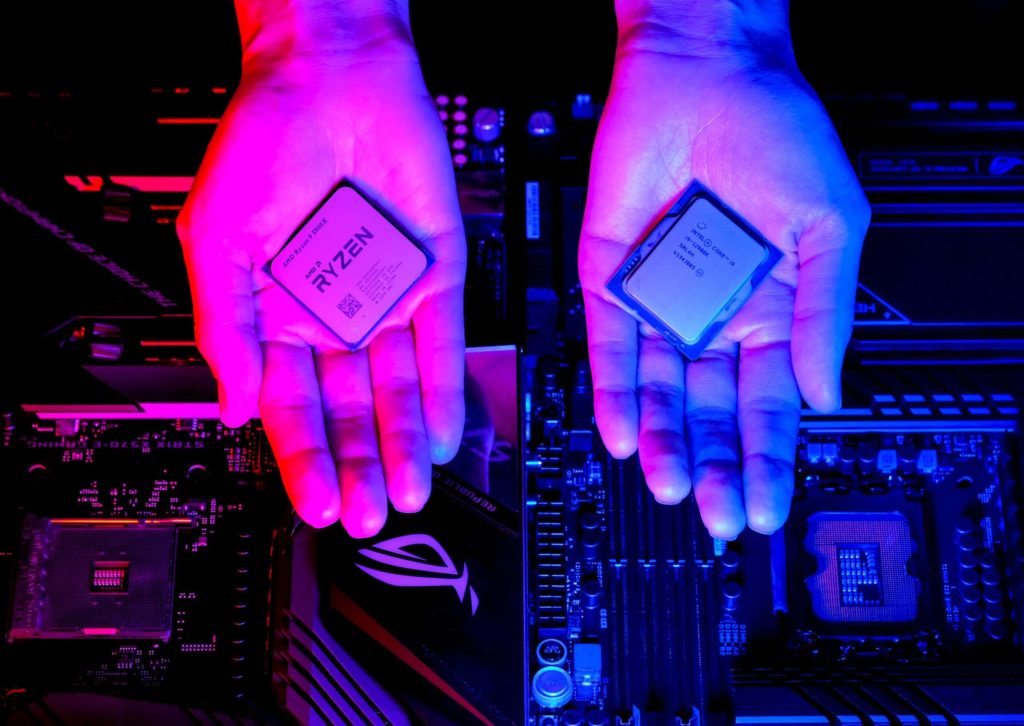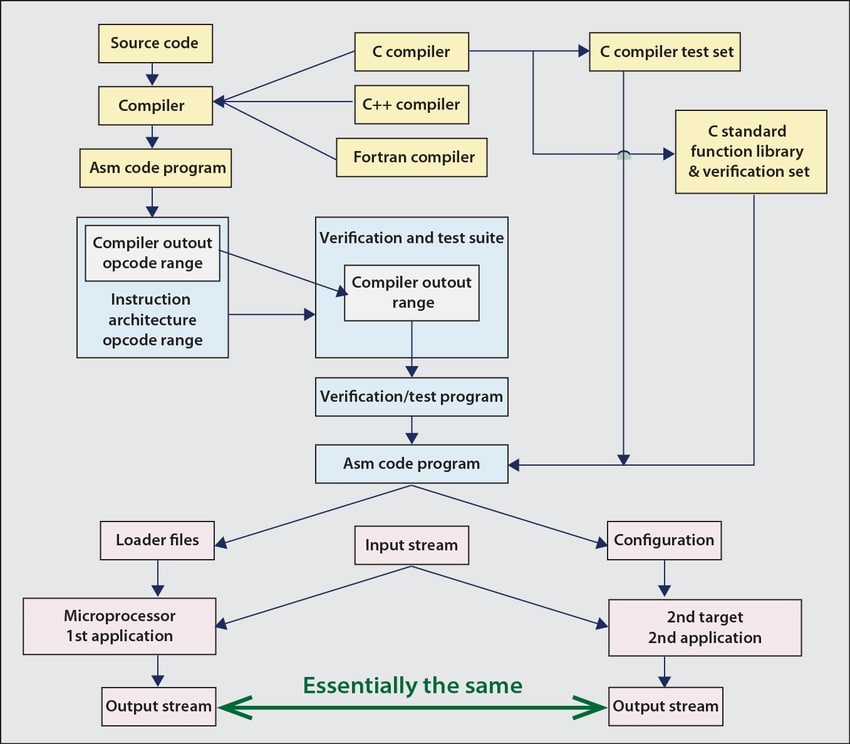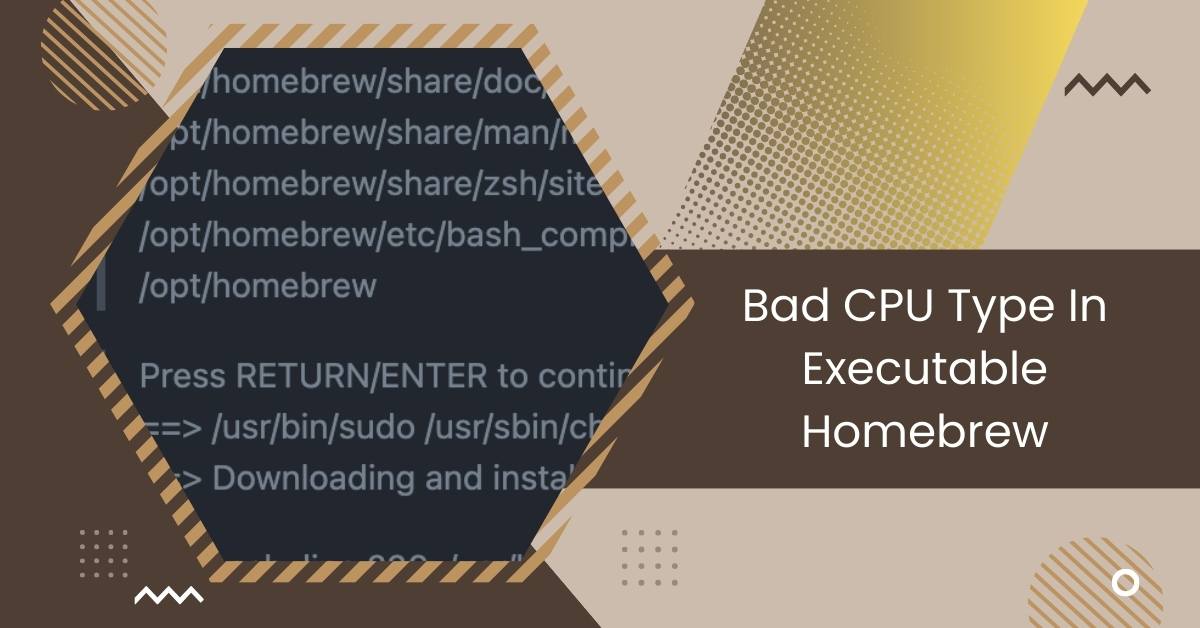Homebrew, the popular package manager for macOS, Linux, and Windows, has gained a reputation for its efficiency and ease of use. However, encountering a “Bad CPU Type in Executable Homebrew” error can be perplexing for users.
Encountering “Bad CPU Type In Executable” with Homebrew indicates compatibility issues with executables. Resolve by updating Homebrew and ensuring packages are compatible with your CPU architecture.
In this article, we will delve into the intricacies of this error, exploring its definition, causes, and effective troubleshooting methods.
Understanding Homebrew:
1. Overview of Homebrew:
Homebrew is a powerful package manager that simplifies the installation of software on various operating systems.
It relies on a vast repository of packages, providing users with a seamless way to install, update, and manage applications. Understanding the basics of Homebrew is crucial for addressing issues like the Bad CPU Type error.
2. Importance of Compatibility:

One key aspect of Homebrew is its compatibility with different systems. The package manager must align with the architecture and specifications of the user’s CPU to ensure smooth execution of applications. Any deviation from this compatibility can result in errors like “Bad CPU Type.”
3. Significance of Executable Files:
The heart of Homebrew lies in its execution of executable files. These files are tailored to specific CPU architectures, and any mismatch can lead to the dreaded Bad CPU Type error. It is essential to comprehend the role of executable files in the Homebrew ecosystem.
Read: Why Does My CPU Keep Spiking – Causes And Tips In 2024!
Bad CPU Type Explained:
1. Definition and Implications:
If you see a “Bad CPU Type” error, it means the computer’s brain (CPU) doesn’t match what a program expects. This mismatch can make Homebrew not work right. Knowing about this problem helps fix it better.
2. Identifying Bad CPU Type Errors:

Recognizing a Bad CPU Type error is the first step towards resolving it. Users often encounter error messages during installation or execution, indicating the specific nature of the problem. Identifying these error messages is vital for targeted troubleshooting.
3. Common Platforms Affected:
Bad CPU Type errors can manifest on various platforms, including macOS, Linux, and Windows. Each platform has its nuances, and understanding the commonalities and differences is essential for devising comprehensive solutions.
Causes of Bad CPU Type in Homebrew:
- Outdated Homebrew Installation:
One prevalent cause of Bad CPU Type errors is an outdated Homebrew installation. Regular updates to Homebrew ensure compatibility with the latest CPU architectures. Failure to update may result in errors, including Bad CPU Type.
- Incompatible Architecture:
Mismatched CPU architectures, such as attempting to run a 64-bit executable on a 32-bit system, can trigger the Bad CPU Type error. Users must be vigilant about the architecture of their systems and the compatibility of Homebrew packages.
- Operating System Variations:
Differences in operating system versions can also contribute to Bad CPU Type errors. Certain packages may be optimized for specific OS releases, and attempting to run them on outdated or incompatible systems can lead to errors.
Read: Why Is My CPU Not Being Utilized – Troubleshoot CPU Issues!
Troubleshooting Bad CPU Type Errors:
1. Updating Homebrew:
The first step in resolving Bad CPU Type errors is ensuring that Homebrew is up-to-date. Running the brew update command fetches the latest package information and updates Homebrew itself. This simple yet effective step can address compatibility issues.
2. Verifying Architecture Compatibility:

Users should verify that the CPU architecture of their system aligns with the requirements of the Homebrew package.
Checking system information or using commands like name -m can provide insights into the architecture, aiding in troubleshooting.
3. Resolving OS-Specific Issues:
In cases where Bad CPU Type errors are OS-specific, addressing underlying operating system issues is crucial.
This may involve updating the OS, installing required dependencies, or adjusting system settings to match Homebrew requirements.
Prevention Tips:
- Keeping Homebrew and Dependencies Updated:
Regularly updating Homebrew and its dependencies is a proactive measure to prevent Bad CPU Type errors. This ensures that the package manager remains synchronized with the evolving landscape of CPU architectures.
- Checking Compatibility Before Installation:
Before installing any Homebrew package, users should check compatibility with their system. Consulting Homebrew documentation or community forums can provide insights into potential issues and compatibility requirements.
- Staying Informed about OS Updates:
Being aware of operating system updates is crucial for maintaining compatibility. Users should stay informed about new releases, ensuring that their system is equipped to handle the latest Homebrew packages without encountering CPU architecture conflicts.
Read: Can I Use CPU Cable For GPU – Check Compatibility – 2024!
Future-proofing Homebrew Installations:

1. Choose Compatible Packages:
- Ensure packages are compatible with your system’s CPU architecture.
- Opt for packages that are actively maintained and updated for future compatibility.
2. Regularly Update Homebrew:
- Keep Homebrew and installed packages up to date to maintain compatibility with system updates.
- Run brew update and brew upgrade regularly to ensure you have the latest versions.
3. Monitor System Changes:
- Stay informed about changes in macOS updates and Homebrew releases that may affect compatibility.
- Follow Homebrew’s official announcements and release notes for important updates.
Homebrew Install Error : “Bad Cpu Type In Executable” – Monterey 12.4 #3385
When encountering the Homebrew install error “Bad CPU Type in Executable” on Monterey 12.4 (#3385), ensure compatibility by updating Homebrew and reinstalling problematic packages.
Bad CPU Type In Executable After Migrating To New Macbook
Encountering “Bad CPU Type in Executable” after migrating to a new MacBook suggests compatibility issues. Resolve by updating software and ensuring binaries are compatible with the new CPU architecture.
Read: Docker Incompatible CPU Detected: Check Compatibility – 2024
Fix ‘bad Cpu Type In Executable’ On An M3 Macbook Pro
To fix the ‘bad CPU type in executable’ error on an M3 MacBook Pro, update Homebrew and reinstall problematic packages to ensure compatibility with the M3 CPU architecture.
What Is The Correct Homebrew Installation Command For An M1 Mac Mini And Big Sur?
The correct Homebrew installation command for an M1 Mac Mini running Big Sur is:
/bin/bash -c “$(curl -fsSL https://raw.githubusercontent.com/Homebrew/install/HEAD/install.sh)”
This command installs Homebrew on your M1 Mac Mini with compatibility for the Apple Silicon architecture and the Big Sur operating system.
Fix For Macbook Air M1/M2 — ‘bad Cpu Type In Executable’ Error
To fix the ‘bad CPU type in executable’ error on MacBook Air M1/M2, ensure compatibility by updating Homebrew and reinstalling problematic packages tailored for the Apple Silicon architecture.
[Fixed] Bad Cpu Type In Executable – Installing Java On Macbook
To resolve this issue, ensure you’re installing a version of Java that’s compatible with your MacBook’s CPU architecture, such as the Apple Silicon version for M1/M2 MacBooks. Additionally, make sure to update Homebrew and any related packages to avoid compatibility issues.
How To Fix Bad CPU Type In Executable Homebrew
To fix the “bad CPU type in executable” error with Homebrew, update Homebrew and reinstall problematic packages. Ensure compatibility by verifying that the packages are compatible with your CPU architecture.
Zsh: Bad Cpu Type In Executable
Encountering “zsh: bad CPU type in executable” typically indicates a compatibility issue between the executable and your CPU architecture. Resolve it by ensuring you’re using versions of software compiled for your system’s CPU type.
Read: What Is CPU Package Temperature – Check CPU Temps In 2024
Bad Cpu Type In Executable In Iraf27

Encountering “Bad CPU Type in Executable” in IRAF27 suggests compatibility issues between the executable and your CPU architecture. Resolve it by ensuring compatibility with your system’s CPU type or updating IRAF27 to a version compatible with your system.
Bad CPU Type In Executable Homebrew Mac
To resolve “Bad CPU Type In Executable” error with Homebrew on Mac, ensure compatibility by updating Homebrew and reinstalling problematic packages tailored for your CPU architecture.
Bad CPU Type In Executable Mac Intel
Encountering “Bad CPU Type In Executable” on a Mac with an Intel processor suggests compatibility issues. Resolve by updating software or ensuring compatibility with your Intel CPU architecture.
Arch: Posix_spawnp: Gem: Bad Cpu Type In Executable
Encountering “Arch: posix_spawnp: gem: Bad CPU Type In Executable” suggests a compatibility issue between the gem executable and your CPU architecture. Resolve by ensuring compatibility or updating the gem package.
Bad Cpu Type In Executable: Wine
Encountering “Bad CPU Type In Executable” with Wine suggests a compatibility issue between Wine and your CPU architecture. Ensure you have a version of Wine compatible with your system.
Bad Cpu Type In Executable Xcode
Encountering “Bad CPU Type In Executable” with Xcode indicates a compatibility issue between Xcode and your CPU architecture. Ensure you have the correct version of Xcode for your system.
Read: Windows XP CPU Support List – Compatibility Issues In 2024!
Wrapping This Article
Facing “Bad CPU Type In Executable Homebrew”? Ensure compatibility by updating Homebrew with the correct Git version.
Understanding Homebrew basics and proactive troubleshooting can prevent and address these errors, ensuring a smooth experience.
FAQs
1. What does “Bad CPU Type In Executable Homebrew” mean?
This error suggests a mismatch between Homebrew and your computer’s brain (CPU). It can happen when they speak different languages.
2. Why am I seeing this error during Homebrew use?
It occurs when Homebrew expects a specific CPU type, and your computer’s brain doesn’t match. Updating Homebrew with the right language (Git version) usually solves it.
3. Can outdated Homebrew cause this error?
Yes, if Homebrew is speaking an old language, it might not understand your computer’s brain. Keeping Homebrew updated helps it stay multilingual.
4. How can I prevent “Bad CPU Type” errors in Homebrew?
Regularly updating Homebrew and checking compatibility before installing packages helps keep the conversation smooth between Homebrew and your CPU.
5. Are there quick fixes for this error?
Yes, ensuring your Homebrew and CPU speak the same language by updating and checking compatibility usually resolves the “Bad CPU Type” hiccup.
6. How do I add Homebrew to my Mac path?
To add Homebrew to your Mac path, run echo ‘eval $(/opt/homebrew/bin/brew shellenv)’ >> /Users/your_username/.zprofile.
7. Why is Brew not found on Mac?
If “brew” is not found on Mac, check if Homebrew is installed correctly or try reinstalling it.
8. How do I run Homebrew on my Mac?
Run Homebrew on your Mac by opening Terminal and typing commands like brew install <package>.
9. Is it safe to use Homebrew on Mac?
Homebrew is generally safe to use on Mac, as it installs packages in isolated directories, minimizing system changes.
10. Is it good to install Homebrew on Mac?
Installing Homebrew on Mac is beneficial for managing software packages efficiently and keeping them up to date.
Also Read
- Soft Lockup CPU Stuck – Step By Step Guide In 2024!
- Corespotlightd High CPU – Boost Core Spotlight Performance!
- Integrated Graphics CPU Or Not – Comprehensive Guide – 2024!

Hi everyone, Johns Jack here, your approachable tech aficionado! I’m passionate about CPUs and thrive on keeping up with the newest tech developments. Join me as we delve into the dynamic realm of technology! Visit: Techy Impacts

